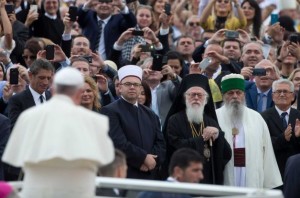
By Sarah Mac Donald - 10 January, 2017

In his annual new year’s address to the diplomatic corps accredited to the Holy See, Pope Francis condemned “homicidal madness which misuses God’s name in order to disseminate death, in a play for domination and power.”
On Monday, the Pope stressed the need to promote peace in a time of mass migrations, economic stagnation and violent extremism.
In what is regarded as the Pope’s most significant foreign policy address annually, the Pontiff called on people of every religious tradition to join in condemning the misuse of God’s name to justify acts of violence.
“[O]ne can never kill in God’s name,” the Pope emphasised as he warned that “Fundamentalist terrorism is the fruit of a profound spiritual poverty, and often is linked to significant social poverty.”
He added that it could only be fully defeated with the joint contribution of religious and political leaders.
“Peace,” Pope Francis said, “is a gift, a challenge and a commitment” that each of us and all together are called to receive, to answer, and embrace with care and dedication.
Offering his assessment of the state of the world, the Pope warned government leaders that they are responsible for ensuring that conditions do not exist that can serve as fertile terrain for the spread of forms of fundamentalism.
This, he said, called for “suitable social policies aimed at combating poverty”.
Pope Francis expressed his gratitude to those countries which offer a generous welcome to those in need, and he specified the European nations of Italy, Germany, Greece and Sweden.
The Pope also warned that the issue of migration is not one that can leave some countries indifferent, while others are left with the burden of humanitarian assistance, “often at the cost of notable strain and great hardship, in the face of an apparently unending emergency”.
He said all nations should feel responsible for jointly pursuing the international common good, also through concrete gestures of human solidarity; “these are essential building-blocks of that peace and development which entire nations and millions of people still await”.
He also noted the Council of Europe’s initiative on the religious dimension of intercultural dialogue, which in the past year discussed the role of education in preventing radicalisation leading to terrorism and extremist violence.
“This represents an occasion for a better understanding of the role of religion and education in bringing about the authentic social harmony needed for coexistence in a multicultural society,” he argued.
In addition to his concerns about religious extremism, the Pope’s speech also covered nuclear weapons, migration, the rise of populist ideologies as well as the European Union and Brexit.
He recalled how, a century ago, the world was in the grip of the “useless slaughter” of the First World War “in which new methods of warfare sowed death and caused immense suffering to the defenceless civil population” as totalitarian regimes, which were long to be a cause of bitter divisions, began to appear on the horizon.
A hundred years later, while many parts of the world had benefited from lengthy periods of peace, which have favoured opportunities for economic development and unprecedented prosperity, the Pope lamented that for many, “peace appears as a blessing to be taken for granted, for all intents an acquired right to which not much thought is given”.
“For all too many others, peace remains merely a distant dream. Millions of people still live in the midst of senseless conflicts,” he said.
“Even in places once considered secure, a general sense of fear is felt. We are frequently overwhelmed by images of death, by the pain of innocent men, women and children who plead for help and consolation, by the grief of those mourning the loss of a dear one due to hatred and violence, and by the drama of refugees fleeing war and migrants meeting tragic deaths.”
Noting today’s climate of “general apprehension for the present, and uncertainty and anxious concern for the future”, the Pope said he felt it was important to speak a word of hope, which could also indicate a path on which to embark.
“In this regard, I voice my firm conviction that every expression of religion is called to promote peace.”
“I saw this clearly in the World Day of Prayer for Peace held in Assisi last September, during which the representatives of the different religions gathered to ‘give voice together to all those who suffer, to all those who have no voice and are not heard’, as well as in my visits to the Synagogue of Rome and the Mosque in Baku.”
Calling for authentic dialogue between different religious confessions, he said “Such dialogue is possible and necessary, as I wished to show by my meeting in Cuba with Patriarch Kirill of Moscow, as well as by my apostolic journeys to Armenia, Georgia and Azerbaijan, where I sensed the rightful aspiration of those peoples to resolve conflicts which for years have threatened social harmony and peace.”